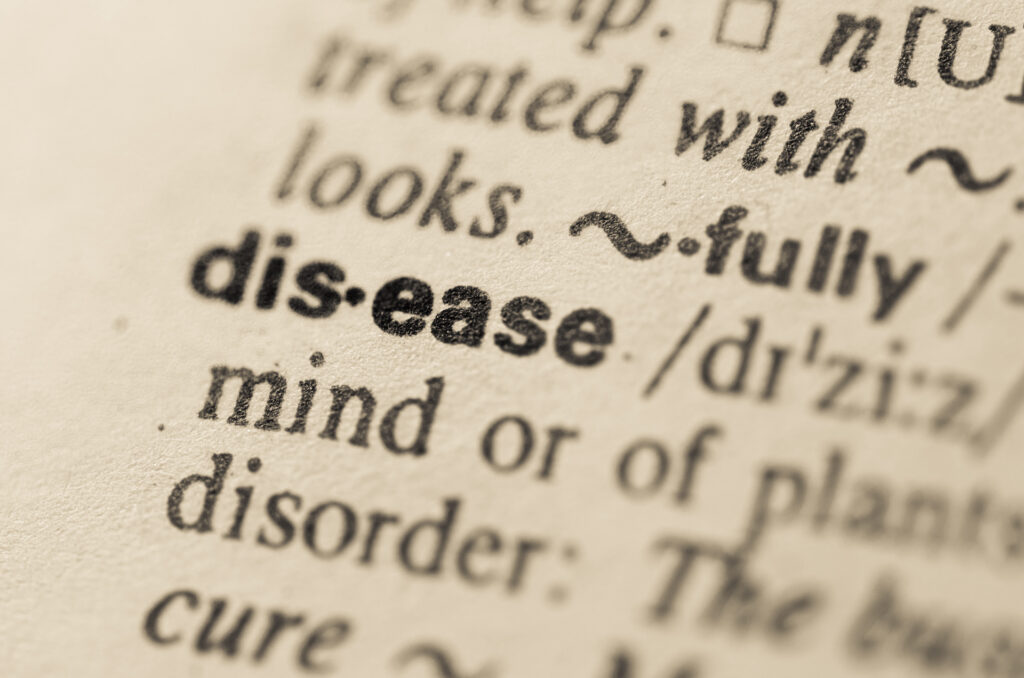Several SCHC alumni have been asking recently about the biology of addiction. One asked whether eating sugar was a sign that one was still in addiction (sugar is a mood-altering substance). Another fellow asked if it were possible to be born an addict.
These questions are asking if addiction is mainly a biological condition. That is, is addiction mainly a disease or an illness? There’s a lot of controversy about whether addiction is a disease or not. This debate is a good thing because it means that people are talking openly about what addiction is. There is energy on both sides of the debate, bringing in new life.
This article will look at this debate. Disease or illness; researchers and clinicians like to argue about these details. However, for those in recovery, this is not an academic question removed from life. The answer that you tell yourself will dictate, in large part, how you live your life in recovery.
Those who believe that addiction is a disease will likely have a different recovery plan than those who think otherwise.
Is Addiction a Disease?
If you believe addiction is a disease then you face certain ‘realities’. For example, you have to come to terms with the ‘fact’ that the disease of addiction has no cure. Most people compare it with diabetes, others say it is a “brain disease” like depression. In either case, recovery demands daily treatment. This treatment may be through self-help programs such as Alcoholics Anonymous or SMART Recovery. It may also be through long-term counselling. Or both.
Those who adhere to the disease model also believe that they will always have a dagger hanging over their heads. They have to learn to accept this situation because having a slip means there is a real danger of again being overcome by the addiction—it’s the interaction of the drug with the brain that is the addict’s illness.

Those who do not believe addiction is a disease still have to deal with the effects of drugs on their brains. They know they will have to deal with cravings and other neurobiological effects. Simply, they know that they will likely have trouble if they are not true to themselves. Still, they don’t believe that they are only one drink or drug away from being plunged back into active addiction. This is because they do not believe that the substance is the problem; they don’t believe that their brains are hijacked by the drug.
Generally, they believe that they will ‘recover’. Those who believe in the disease model, on the other hand, face the prospect that they will be in recovery for the rest of their lives.
So, let’s examine some of the more public examples of the disease debate. As always, if you are in recovery, you are the author of your life, so you’ll have to figure this out for yourself.
Alcoholics Anonymous and Disease
The Big Book of AA states that alcoholism is an “illness.” Of course, it’s a very strange illness, since the Big Book also says that alcoholism is “an illness which only a spiritual experience will conquer.” At one point, the book calls alcoholism a “spiritual disease.”
When we examine the meaning of the words illness and disease in the Big Book, it is obvious that they are not technical terms. Bill W. never took a medical course in his life and certainly knew nothing of Koch’s Postulates (or other illness definitions), which is how diseases have been identified scientifically for more than a century.
The early members of AA wanted to point out a couple of things about alcoholism. First, they knew that alcoholics reacted differently to alcohol than non-alcoholics. They were also convinced that there must be a biological reason for this, which is why AA looked to Dr. William Silkworth and several other physicians as sources of scientific information.
It is one of the more baffling things historically that AA became associated with the disease/illness model of addiction. AA is, after all, a group of alcoholics, not medical doctors. Most experts have suggested that the reason why the public links AA with the disease was that AA received two major public awards.
The 1951 Lasker Award of the American Public Health Association was awarded to AA. The citation read, in part, “In emphasizing alcoholism as an illness, the social stigma associated with this condition is being blotted out.” The 1983 President’s Service Medal was presented to AA, praising Bill Wilson and Bob Smith for “helping each other to overcome the disease.” So the public latched on to these medical ideas, even though the Big Book clearly considers alcoholism as a “spiritual condition that requires a spiritual solution.”
Agreeing on What is Considered a Disease
Perhaps the most famous addiction medical doctor (a psychiatrist), George Vaillant, says that addiction is a “disease.” Dr. Vaillant is a top-of-the-line researcher at Harvard University Medical School. In fact, the medical doctors who specialize in addiction medicine state publicly in their association that addiction is a disease.
It’s interesting that, because Dr. Vaillant knows so much, he is very open in saying that there are good reasons for not calling alcoholism a disease!
One of his major points is that medical experts don’t actually agree on what a disease is. They keep changing their minds about whether, for example, heart disease is a disease or a lifestyle problem. He lists several other objections, but the most important is that alcoholism is a “behaviour.” In fact, he says, “Alcoholism is often better treated by psychologists skilled in behaviour therapy than by physicians with all their medical armamentarium.”

Although Vaillant is quite convinced that alcoholism is a medical issue, he also says “In other words, calling alcoholism a disease, rather than a behaviour disorder, is a useful device both to persuade the alcoholic to admit his alcoholism and to provide a ticket for admission into the health care system. I willingly concede, however, that alcohol dependence lies on a continuum and that in scientific terms ‘ behaviour disorder’ will often be a happier semantic [word] choice than ‘disease’.”
To sum up, if addiction is a disease, it’s an odd one; and, technically, it is probably better to call it a behaviour disorder. However, if alcoholics think they have a condition similar to heart disease or diabetes, then they will more likely ask for help. And if the public thinks it is a disease, then it won’t stigmatize addicts and think of them as criminals and irresponsible layabouts.
Finding a “Cure”
The July 16, 2007, issue of Time magazine said that addiction is a “disease,” because drugs “co-opt” the brain. The March 3, 2008, issue of Newsweek reported that drug use is a “disease,” because drugs “hijack” the brain, leaving the addict powerless.
The journalists who wrote for Time and Newsweek got their information from Nora Volkow and her colleagues. Dr. Volkow is the head of the National Institute of Drug Abuse (NIDA). NIDA is the US national institute of health concerned with ‘drugs’ (the other is the ‘alcohol’ institute of health). These institutions are funded by the federal US government and are quite public that they consider addiction a disease.
Dr. Volkow’s perspective is a little different than Dr. Vaillant’s. Volkow is more specific, calling it not merely a disease, but a “brain disease.” It’s almost routine that when journalists want information, they ask NIDA, which is why Volkow shows up often on television and in newspapers and magazines.
Basically, she says that addiction is biological, a direct result of the effects of the substance interacting with the brain. The brain progressively deteriorates just as in any disease. From her point of view, because addiction is a disease, it will be ‘cured’. Through some medical procedures yet to be discovered, she is quite certain that we will eliminate the disease, just as we have essentially eliminated leprosy.
Of course, other brain scientists think Dr. Volkow’s belief in a cure is wishful thinking. One of their major arguments is that the brain is so complex that it will likely not be possible.
Addiction is Not a Disease
So, now we have shown the theories of two of the finest scientific minds studying addiction: Dr. George Vaillant of Harvard Medical School and Dr. Nora Volkow, who is head of one of the biggest drug research institutes in the world.
Both of these scientists tell us that addiction is, essentially, a disease. But other, equally competent researchers say it is not a disease. These anti-disease experts argue that although there may be a physical basis in the brain for drug use, this does not mean addiction is a disease, and many say it is not even an illness.
They provide lots of evidence for not considering addiction as a disease. William Miller, one of the gurus in the field, says that addiction is a matter of motivation. Bruce Alexander says that drug use is a response to not having a deep sense of belonging (remember Rat Park). Stanton Peele says that drug use is essentially a combination of a lack of direction in life and an unhealthy environment. In fact, Stanton Peele wrote a book complaining about the medical professionals who were attempting to convince us that we’re all diseased.
Conclusion
Thinking of addiction as a disease poses some problems. First, it eliminates sex, gambling, and other behaviours as addictions, because there is no substance to “hijack” the brain. They also point out that there are documented cases of alcoholics becoming social drinkers, something which seems impossible if addiction is a physical illness. And they point out that Dr. Lee Robins would not have found that most Vietnam Vets gave up the heroin on their own after they returned to the US if heroin had “hijacked” the soldiers’ brains.
Almost all psychology textbooks used in universities show research that contradicts the idea that addiction is a physical illness.



